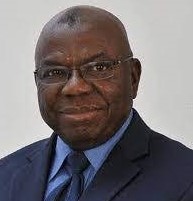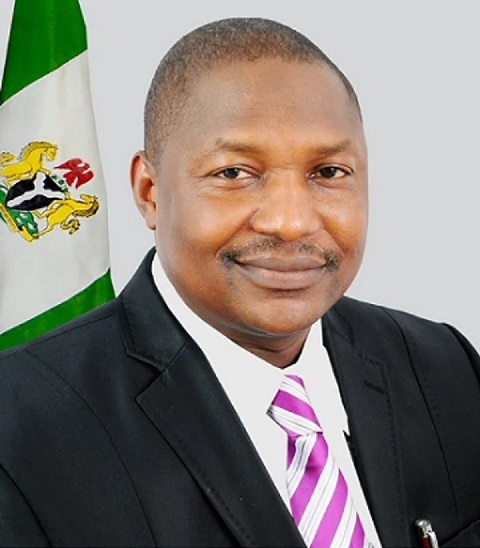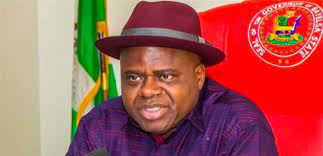COVER
Speak Truth to Power, Ex- Envoy, Hagher Tasks Scholars

A former Nigerian High Commissioner to Canada and Envoy to Mexico, Professor Iyorwuese Hagher, has called on Nigerian writers to speak truth to power and hold leaders accountable using their literally works.
The erudite scholar made the call in Abuja at the public presentation of his books titled: “Warrior for Humanism” and “The Conquest of Azenga.
”Speaking at the event, which also marked the celebration of his ‘Literary Oeuvre And Life As Scholar Diplomat, Public Servant and Patriot, Hagher
called on all Nigerian writers to muster the power of their writing to roll back violence from the land.
“We must continue to talk truth to power, hold power accountable, and take command of our presence and future existence through humane policies and actions.
“I am aware that many writers in the Western world enjoy the luxury of
ignoring the political turmoils of their times. They claim that it is not their responsibility to find solutions to the world’s problems.
“This luxury is unaffordable to the African writer and creative artist. For indeed
while it may not be our responsibility to find solutions to Africa’s many problems, we are not free to ignore them, nor free to refuse to attempt to find solutions to them.
“All creative writing is political. We are either contend with the status quo, or like me, we are dissatisfied with the status quo, of things in Africa. This is why we write, and I personally am not just dissatisfied, I am mad at how things are. I am mad at how we treat our weak and downtrodden, our youth, and our
women.
“We must infuse a new consciousness based on education and rationality
rather than attempts to mirror the world of magic, spells, and enchantment which is killing our people, and making
them spare human parts for rituals. Our rural people in villages and humble slums have been given a permanent
inferiority complex,” he said.
He also tasked the politicians to look at the present security challenges as a unique opportunity to rise to the true
calling as leaders and to embrace healing. “A young democracy like ours is bound to be messy. Democracies
tend to be messy.
“This is the time for us to think deeply
and far for the future of our children. Our present security nightmare and descent into dystopia have made responsible people reticent, self-effacing, and opting to hide to avoid being harmed or hurt.
“As political leaders, we must understand that leaders are leaders only when they
act as leaders. Leadership is acting responsibly in doing the right things rather than doing selfish wrong things.
Leading is not seats and positions occupied. It is actions taken in situations that make the followers better.
“We need a different type of politics and politicians. We must shun the politics of meanness and cruelty that is in
vogue for one of empathy and love. We must close the gap between elected officials and the voters. The voters
do not deserve the horsewhips and the gun-totting invasions from the police that are their servants,” he added.
While advocating for a national theatre tradition for peace-building, Hagher called on writers to make the liberation of African women a top priority. “They complete us. They are an equal part of us. We have continued to oppress them so much that they have become used to being beasts of burden.”
Earlier, the Benue state governor, Samuel Ortom, lauded the contributions of Hagher to the development of Nigeria via his literally works.
Ortom who was represented by the Commissioner for Education, Professor, Dennis Ityavyar said, “Professor Hagher is such an example of someone who is holding torchlight and getting in the dark corners where you get ideas that would be used for development of this country.
He further cleared the perception that the Tiv people and Fulanis are at loggerhead, saying they are not enemies
“I need to also said that the Tiv people historically embraced all the Fulanis and I would like to submit that the friendship still exists and so I want those people who are trying to sale what’s wrong to the people. We the Benue people are not against the Fulanis. We are still friends and what other people are selling is not acceptable.
“The anti- open grazing law is a very progressive idea, which is done in almost all the countries of the world. Any Fulani person who wants to establish a ranch in Benue will have a land,” he added.
On his part, the chairman of the Senate Committee on Power, Hon Gabriel Suswam, commended Hagher for his contributions to the development of Nigeria, saying the acclaimed problem between Tiv and Fualni is the created by the elite.
“We the Tiv people don’t have any problem with the Fulanis. What is going on are series of criminals who are being used by the elites”
The celebratory drew together scholars from Canada, diplomats and academics from across the country.
COVER
DAILY ASSET Appoints Torough, Editor, Names Eze, Deputy

By Laide Akinboade, Abuja
As part of efforts to reposition the newspaper for optimum corporate performance, the management of Asset Newspapers Limited, Publishers of DAILY ASSET, has announced the appointment of David Torough as the Editor of the Abuja-based national daily.
A statement by the management said the appointments were part of the company’s new strategy to further penetrate the various states in the country and raise its readership and patronage.
“DAILY ASSET is widely acceptable across the country and to maintain our leadership position, we need to increase management presence, hence the need to create new Bureau offices in some locations outside Abuja and Lagos,” the statement quoted the Publisher/ Editor-in-Chief, Dr Cletus Akwaya to have said.
In a statement yesterday, Publisher and Editor-in-Chief of the fast-growing daily, Dr. Cletus Akwaya said the appointment was part of the new strategy to properly situate the paper for better productivity.
“DAILY ASSET has a commitment with the Nigerian people. We are determined to weather the storm and give Nigerian readers a Newspaper that satisfies their yearnings and reading pleasure and we can only do that with the right set of professionals,” the statement said.
Akwaya, a former Commissioner of Information from Benue State said the difficult times being faced by Nigerians posed a great challenge to the media as the people deserved credible information with which to make choices.
“We have a bond with the people, to offer credible information at all times in the best tradition of the Nigerian Press and on this scale of objectivity, truth and fairness, we pledge to remain steadfast no matter the challenges,” Akwaya was quoted to have said.
He said the newspaper will maiantin its daily print run and circulation to all states of the federation and urged advertisers to take advantage of the deep penetration of the Daily Asset brand to send their messages.
Torough, the new Editor has had a steady rise in the Newspaper in the last five years.
A graduate of Mass communication of the Benue State University, Makurdi, Torough joined the company in 2022 as Benue State Correspondent. He was spotted for his brilliance and redeployed to Abuja the following year and promoted to Deputy News Editor. He was subswuently named Deputy Editor of the paper, a position he held until the recent appointment.
Torough has attended several journalistic workshops and trainings to properly equip himself for the task ahead.
The statement also said the Management named Eze Okechukwu as Deputy Editor.
Before his elevation as Deputy Editor, Eze has been Deputy Politics Editor and DAILY ASSET Newspaper correspondent covering the Senate, having joined the organization in 2021.
Born on March 10, 1975, Eze holds a Masters Degree in Mass Communication from the Enugu State University of Science and Technology.
Eze began his journalism career with Daily Star, Enugu and later worked with Daily Trust Newspaper, Abuja as sports reporter.
Aside from his journalistic excellence, he has a great deal of passion for sports.
COVER
Insecurity: Northern Govs, Monarchs Seek Six-month Mining Suspension

From Ngutor Dekera, Kaduna and Aliyu Askira, Kano
Northern governors and traditional rulers yesterday called for the suspension of mining activities across the region for six months, blaming illegal mining for worsening insecurity in many states.The resolution was contained in a communiqué issued after a joint meeting of the Northern States Governors’ Forum and the Northern Traditional Rulers’ Council held at the Sir Kashim Ibrahim House, Kaduna.
The meeting, chaired by the Gombe State Governor and NSGF Chairman, Muhammadu Yahaya, had in attendance the 19 northern governors and chairmen of the 19 states’ traditional councils. The Forum expressed concern over the escalating violence in parts of the North, including the killings and abductions recently recorded in Kebbi, Kwara, Kogi, Niger, Sokoto, Jigawa and Kano states, as well as renewed Boko Haram attacks in Borno and Yobe.“The Forum extends its deepest condolences and solidarity to the governments and good people of the affected states,” the communiqué said, noting that the attacks on schoolchildren and other citizens had become “unacceptable tragedies” that required urgent collective action.It commended President Bola Tinubu for what it described as the Federal Government’s “firm response” to recent abductions and insurgency threats, especially the rescue of some abducted pupils.The governors also saluted security agencies for their sacrifices on the frontlines.“We resolved to renew our support for every step taken by the President and Commander-in-Chief to take the fight to insurgents’ enclaves in order to end the criminality,” the Forum stated.A major highlight of the meeting was the North’s renewed push for the establishment of state police, with governors and traditional rulers insisting that decentralised policing had become inevitable.“The Forum reaffirms its wholehearted support and commitment to the establishment of state police,” the communiqué added, urging federal and state lawmakers from the region to “expedite action for its actualisation.”On illegal mining, the governors said criminal mining networks were fuelling violence and providing resources for armed groups.As a corrective measure, they asked Tinubu to direct the Minister of Solid Minerals to impose a six-month suspension of mining activities in order to allow for a full audit and revalidation of licences.“The Forum observed that illegal mining has become a major contributory factor to the security crises in Northern Nigeria. “We strongly recommend a suspension of mining exploration for six months to allow proper audit and to arrest the menace of artisanal illegal mining,” it said.To strengthen the fight against insecurity, the governors also announced the creation of a regional Security Trust Fund.Under the proposed arrangement, each state and its local governments will contribute ₦1bn monthly, to be deducted at source under an agreed framework.They said the fund would help provide sustainable financing for joint operations, intelligence-driven interventions and coordinated security responses across the region.At the end of the meeting, the Forum reaffirmed its commitment to unity and collective responsibility.“Only through unity, peer review and cooperation can we overcome the pressing challenges before us,” it declared.The Forum agreed to reconvene on a date to be announced.Meanwhile, Nigeria’s worsening security crisis took a grim turn on Monday as bandits launched fresh attacks in Kano State, abducting 25 villagers, even as the Federal Government raced to secure the release of more than 300 Catholic school children kidnapped in Niger State.In the early hours of Monday, armed bandits invaded Unguwar Tsamiya—popularly called Dabawa—in Shanono Local Government Area of Kano State, whisking away nine men and two women after shooting into the air and assaulting residents. The attackers also rustled two cows.A resident lamented the community’s helplessness: “We cannot do otherwise; most of us cannot leave because we have nowhere to go. This is our place, our land and everything is here.”The assault came less than 24 hours after a similar attack on Yan Kamaye in Tsanyawa LGA, a community along the volatile Katsina border.In Niger State, National Security Adviser Nuhu Ribadu has assured distraught families of St. Mary’s Co-Education School, Kontagora that the more than 300 students and staff abducted on November 21 will return home “soon.” Ribadu, who led a high-level federal delegation to the school on Monday, said the abductees are safe, though he offered no specifics on their location or the status of rescue operations.According to Daniel Atori, spokesman for the Catholic bishop overseeing the school, the NSA reassured officials: “The children are where they are and will come back safely.”The St. Mary’s attack is part of a worrying resurgence of mass kidnappings reminiscent of the 2014 Chibok schoolgirls’ abduction. Security analysts warn that banditry has evolved into a “structured, profit-seeking industry,” with hundreds of Nigerians abducted in November alone.The Kontagora school abduction occurred the same week 25 girls were kidnapped in Kebbi State—victims who authorities say have since been rescued through “non-kinetic” means. About 50 of the St. Mary’s hostages have also managed to escape.Ribadu’s delegation, which included the Minister of Humanitarian Affairs and the Director-General of the Department of State Services (DSS), reaffirmed the government’s commitment to securing the freedom of all abducted citizens.As communities from Kano to Niger continue to bear the brunt of these violent incursions, the escalating spate of kidnappings underscores the urgent national demand for a more decisive and coordinated security response.COVER
Abacha Loot Probe: Malami Faces EFCC Panel Daily in December

By David Torough, Abuja
The Economic and Financial Crimes Commission (EFCC) said former Attorney‑General of the Federation and Minister of Justice, Abubakar Malami, will face a team of interrogators at its office daily throughout December.A credible source in the EFCC said on Monday that the daily appearance was part of an ongoing investigation into the whereabouts of an alleged 490 million dollars Abacha loot secured through a Mutual Legal Assistance (MLAT) request.
The source said that Malami, who was summoned for interrogation by the EFCC on Saturday, was barred from leaving Nigeria for the next one month.According to the source, one of the conditions for his release on Saturday was that he should report daily to the EFCC Headquarters in Abuja for further interrogation.The source said Malami would have to appear daily at the anti-graft office due to the volume of the investigation and the seriousness of the charges against him.”We seized his passport, it is the normal routine during investigation, but he has to report at the EFCC headquarters in Abuja every day for the next month.”He will be reporting for further investigation throughout December.”He will be reporting every day, starting from Dec. 1st to Dec. 31st.He will appear before the team of investigators for the entire month of December.”He will be reporting to EFCC for investigation for the period because of the volume of the investigation and the seriousness of the charges against him,” the source added.According to the source, a fact sheet on the former minister revealed that Malami had several issues to clarify with the EFCC within the coming weeks.“We have asked him to explain the whereabouts of the $490 million Abacha loot secured through MLAT.“We didn’t say he stole money, but he should account for the loot. This is one of the issues he will clarify to our investigators.”The commission cited the large volume of documents he must review and the need for extensive interviews as reasons for seizing his passport.The source said EFCC would not engage in a war of words but would release its findings after a thorough investigation.Malami, in a statement by his media aide, Mohammed Doka, on Monday in Abuja, however, described the EFCC investigation as a political witch‑hunt.He confirmed he honored an EFCC invitation on Nov. 28, describing the engagement as fruitful and expressing confidence that the probe would vindicate him.Malami described the EFCC’s allegations as baseless, illogical and devoid of substance, insisting they collapse under factual scrutiny.




























